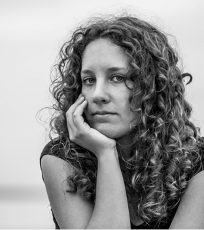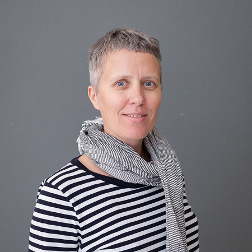ECSA 2024 Conference Programme
April 3, 2024: Opening of the conference (BOKU)
April 4, 2024: Second day of the conference (BOKU)
April 5, 2024: Third day of the conference and closing (BOKU)
April 6, 2024: Citizen Science Day (NHMW)
Create your individual conference programme:
desktop - mobile
Keynotes
April 4, 2024
9:00-10:00, TÜWI HS01, Peter-Jordan-Straße 76, 1190 Vienna and Online
Shannon Dosemagen
The Challenge of Continuous Adaptation: Citizen Science for a Changing World
We’re at an unprecedented moment in human history. Technology is outpacing policy, transformations through open science have yet to become mainstream, climate change and the loss of biodiversity speed along faster than solutions. But the human ability to thrive in the face of adversity means there is hope. The fundamentals of citizen science can offer us ways forwards in this era of discontinuity – what is essential and what new approaches do we need to embrace?

Shannon Dosemagen directs the Open Environmental Data Project (OEDP). OEDP focuses on building spaces to grow the global conversation on environmental and climate data access and use. Previously, she co-founded and served for a decade as Executive Director of Public Lab, a community that uses open approaches to support people in addressing environmental issues. Dosemagen is a co-founder of the Gathering for Open Science Hardware, and serves on the boards of the Open Science Hardware Foundation, Code for Science and Society, and the (U.S.) National Parks Conservation Association. For her work, she has been awarded Fellowships with the Shuttleworth and Claneil Foundations, and at the Berkman Klein Center for Internet and Society, Harvard University. She previously chaired the (U.S.) National Advisory Council on Environmental Policy and Technology (NACEPT) and the Citizen Science Association.
April 5, 2024
17:00-18:00, TÜWI HS01, Peter-Jordan-Straße 76, 1190 Vienna and Online
Katja Mayer
Participatory Turns: The bumpy roads to recognition of participatory approaches in the social sciences, and lessons for citizen science
The integration of societal participation into the production of scientific knowledge stands as a core principle within citizen science. Although participatory methods have a long tradition in the social sciences — exemplified by participatory action research in fields like sociology, education, and anthropology — a historical examination unveils the intricacies and obstacles tied to these methods' acceptance and application. Historically, participatory research often found recognition only on the fringes of academic discourse, encountering structural and power-related barriers. Moreover, the demarcation between political engagement and social science research was a recurring dilemma.
In my presentation, I will explore the intricate history of participatory research methodologies spanning various epistemic cultures and scholarly practices. I aim to shed light on the historical challenges these methods faced, including the power disparities disadvantaging participatory researchers and the hurdles in creating sustainable structures for such methodologies. Through specific examples, I will delve into the lessons that can be drawn for structuring and managing citizen science initiatives, particularly focusing on governing participation and acknowledging the contributions of all stakeholders in the collective knowledge production process. The aim is to delineate strategies through which participatory research can effectively navigate practical hurdles, thereby cultivating an inclusive, appreciative transdisciplinary research and development environment conducive to social change.

Katja Mayer is Elise Richter Fellow at the University of Vienna’s Department of Science and Technology Studies exploring the interface of science, technology, and society, with a particular emphasis on the politics of open science and data infrastructures in the social sciences. She has been part of the Horizon Europe CoAct Project, studying how evaluation of citizen science projects could be done more participatory.
Her research spans from research and innovation policy to science diplomacy. With prior experience in the IT industry, as visiting fellow at Carnegie Mellon University, as a research advisor to the President of the European Research Council, and postdoc at the TU Munich’s chair of Computational Social Sciences and Big Data, she’s well-versed in the practical and theoretical aspects of her field. Furthermore, she is senior scientist at the Center for Social Innovation ZSI in Vienna and member of the Uni Vienna research platform Governance of Digital Practices.
www.katjamayer.net
Panel discussion "Mainstreaming Citizen Science in Europe - Status Quo and Future Perspectives"
Wednesday, 03.04.2024, 09:00-10:00 am
Participants in the panel discussion:
- Barbara Weitgruber (Directorate-General V - Scientific Research; International Relations; Gender Equality and Diversity Management, Austrian Federal Ministry of Education, Science and Research)
- Susanne Hecker (Chairwoman of the European Citizen Science Association)
- Maina Muniafu (Chairman CitSciAfrica)
- Dejan Dvorsek (Deputy Head of Open Science and Research Infrastructures unit, DG Research and Innovation, European Commission)
Moderation: Christoph Rohrbacher
In this panel discussion, the panellists will reflect on the development of citizen science over the last ten years and discuss together how the future of the field could be shaped to promote the mainstreaming of citizen science in Europe and globally. How is the future of citizen science seen in Europe and the world? What role does citizen science play in the current changes taking place around the world? How is the mainstreaming of citizen science, i.e. the integration of citizen science into existing funding programmes or the awarding of special citizen science funding, viewed? Are these positive or negative developments? What are the advantages and disadvantages? How does citizen science fit into new concepts of excellence? Does citizen science need its own criteria for excellence? How can the institutionalisation of citizen science (e.g. new infrastructures, new job profiles, long-term funding, embedding citizen science in strategies, etc.) be supported?
ECSA 2024 Book of Abstracts
Poster Presentation Video
Preview social events:
April 3, 2024: Conference dinner at the traditional Heuriger Fuhrgassl-Huber (Menu).
April 4, 2024: Evening event at the Natural History Museum Vienna with DJ lineup, open exhibition and fashion show.
April 6, 2024: Citizen Science Day at the Natural History Museum Vienna with museum and city tours, project presentations, interactive marketplace and much more.



